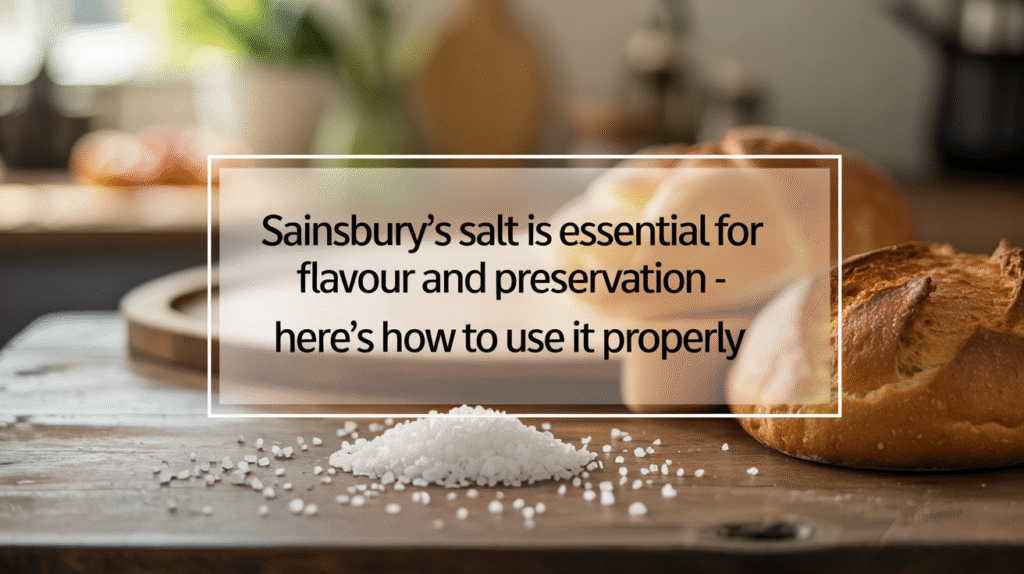Sainsbury’s Salt is a fundamental ingredient in both cooking and baking, enhancing flavour, preserving food, and even aiding in texture development. With varieties ranging from standard table salt to sea salt, rock salt, and low-sodium options, it’s more than just a seasoning, it’s a science-backed necessity in every kitchen.

Types of Sainsbury’s Salt and Their Unique Uses
Each type of salt from Sainsbury’s range serves a distinct culinary purpose. Understanding these helps ensure proper use across recipes.
Table Salt
The most commonly used salt in UK kitchens, perfect for general cooking and seasoning.
- Fine-grain texture dissolves quickly in liquids.
- Iodised varieties support thyroid health.
Sea Salt
Harvested from evaporated seawater, sea salt offers a pure and natural flavour.
- Coarser texture ideal for seasoning after cooking.
- Contains trace minerals absent in refined salt.
Rock Salt
Large, unrefined crystals best used for grinding or preserving.
- Suitable for salt grinders to add texture at the table.
- Can be used in ice-cream makers or curing meats.
Low-Sodium Salt
Designed for those managing their salt intake due to dietary or medical reasons.
- Blended with potassium chloride to reduce sodium content.
- Ideal for heart-conscious diets.
Why Sainsbury’s Salt Is a Trusted Kitchen Staple
Sainsbury’s offers high-quality salt options, all tested for safety and consistency.
Reliable Quality Standards
All Sainsbury’s salt products meet British and European food quality standards.
- Free from contaminants and consistent in crystal size.
- Properly packaged to prevent clumping and moisture absorption.
Ethical Sourcing and Variety
Sainsbury’s also includes responsibly sourced sea salt and Fairtrade packaging in certain product lines.
- Some sea salt varieties are sustainably harvested.
- Clearly labelled for consumer transparency.
How Salt Enhances Your Cooking and Baking
Salt is crucial not just for flavour but also for the chemistry behind many recipes.
Enhancing Flavour
Salt brings out the natural taste in both sweet and savoury dishes.
- Balances bitterness and sharpness in vegetables and sauces.
- Amplifies sweetness in desserts like chocolate or caramel.
Controlling Fermentation and Dough Strength
In baking, salt plays a structural role in doughs and batters.
- Strengthens gluten in bread, leading to better rise and texture.
- Helps regulate yeast activity for controlled proofing.
Preserving Food
Salt has been used for centuries to preserve food by drawing out moisture.
- Essential in curing meats and pickling vegetables.
- Inhibits microbial growth and extends shelf life.
Best Practices for Using Sainsbury’s Salt
A little goes a long way, here’s how to make the most of your salt without overdoing it.
Season in Layers
Rather than salting at the end, season throughout the cooking process.
- Add salt when sautéing vegetables to draw out moisture.
- Season meats before and after cooking for full flavour depth.
Measure for Baking
Baking requires precision, and salt is no exception.
- Use digital scales or levelled teaspoons for accurate measurement.
- Never guess or “eyeball” when baking bread or cakes.
Storage and Shelf Life Tips
Salt is naturally long-lasting, but correct storage helps maintain quality.
Keep It Dry
Moisture is the enemy of salt, leading to clumping and spoilage.
- Store in an airtight container.
- Use silica gel packets or a few grains of rice in the shaker to absorb moisture.
Avoid Cross-Contamination
When cooking, use dry spoons and avoid touching salt containers with wet hands.
- Prevents contamination from raw meat juices or other ingredients.
- Keeps salt clean and food-safe.
Salt and Health: What You Should Know
While salt is vital for body functions, too much can pose health risks.
Recommended Daily Intake
According to NHS guidelines, adults should consume no more than 6g of salt per day.
- Too much salt is linked to high blood pressure.
- Read food labels to track daily intake, especially in packaged foods.
Low-Sodium Alternatives
Sainsbury’s Low-Sodium Salt can help reduce overall sodium consumption.
- Blended to taste similar while using less sodium.
- Check with a doctor before using potassium-based salts if you have kidney issues.
FAQs
Here are some questions and answers about Sainsbury’s Salt.
What is the difference between sea salt and table salt?
Sea salt is less processed and contains trace minerals, giving it a coarser texture and more complex flavour. Table salt is refined and may include anti-caking agents and added iodine.
Is salt really necessary in baking?
Yes, salt strengthens gluten in dough and balances sweetness in recipes like cookies and cakes. It also helps regulate yeast fermentation.
Can I use rock salt for cooking?
Rock salt can be used for seasoning if ground first. It’s also great for brining, curing, and in salt crust recipes, but not suitable in its coarse form for precise baking.
Does Sainsbury’s offer iodised salt?
Yes, Sainsbury’s table salt includes iodine, which helps maintain healthy thyroid function. Check the label to confirm.
How should I store salt to prevent clumping?
Store it in an airtight container in a dry place. For shakers, adding a few grains of rice can help absorb moisture.
